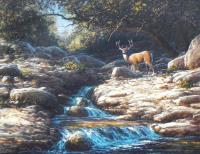
Dennis Schmidt
Primarily self taught, Dennis Schmidt attributes what many describe as the unique and striking vibrance in his work, to a refusal to be restricted by commonly prescribed schools of thought typical to traditional realism and impressionism. He believes that art education in any capacity is useless and debilitating without a profound willingness or the courage to break rules and reconstruct existing guidelines, pursuant to the development of one's personal sensibilities for self expression. Schmidt advises aspiring artists to follow their heart avoiding current trends in lieu of their own personal visions. He warns that the cost of ignoring your own inner voice or spiritual guidance is the death of inspiration and personal growth.
Schmidt’s intense passion for a vast array of subject matter provides him with constant inspiration that prevents his work from ever growing monotonous. His work reflects his reverence for the many things he loves, revealing his source for self renewal and sense of purpose. Viewing his work is to see his soul, to go where he gives thanks and receives his guidance. One cannot help seeing how obviously this man loves his chosen work.
Though landscapes have always been a primary focus in his work, Schmidt’s success is also a result of his very accomplished skill for including in his paintings, other symbols of life that most of us can passionately identify with. While wildlife, horses, working cowboys, and waterfalls are clearly among his favorite subjects, women and American Indians are recently reappearing in his work after a long hiatus.
Painting since 1972, Schmidt worked as a welder and machinist from 1966 until 1976 when he left to embark on his full-time career as an artist. By 1979, the demand for his originals greatly exceeded supply that producing limited edition reproductions was the next logical step. From 1979 to 1990, 31 Limited Editions of his work were sold out. In 1980, Victoria Bank & Trust Co. commissioned Schmidt to produce two originals for their private collection and two complete print editions of 1,000 signed only as gifts to their employees and preferred customers. Though throughout the years print sales proved very profitable for him, he remarks that he ''found it necessary to take an extended vacation from the headaches inherent to reproductions, which were too often keeping him from his real love ... painting.''
Though Schmidt places little value on awards and juried competitions, he is the recipient of over 30 such honors from his 24 year as a professional artist. Among these are numerous Best of Show, Gold Medals, 8 consecutive popular choice awards at the Texas Ranger Hall of Fame and several Artist awards from his peers. Schmidt's work has always sold well in the midst of outstanding competition and he has been honored with countless one-man shows.
Dennis Schmidt served as Vice President of the Texas Association of Professional Artists (TAPA) for six years, until the group retired its charter around 1990. He has been featured in the book Contemporary Western Artists and has been interviewed for numerous publications including ''Southwest Art'' and ''The State of the Art.'' In 1978, Schmidt was the first artist ever honored with a one man show at the Texas Ranger Hall of Fame. Born in 1950, Dennis is a native of Texas living in Austin since 1988.